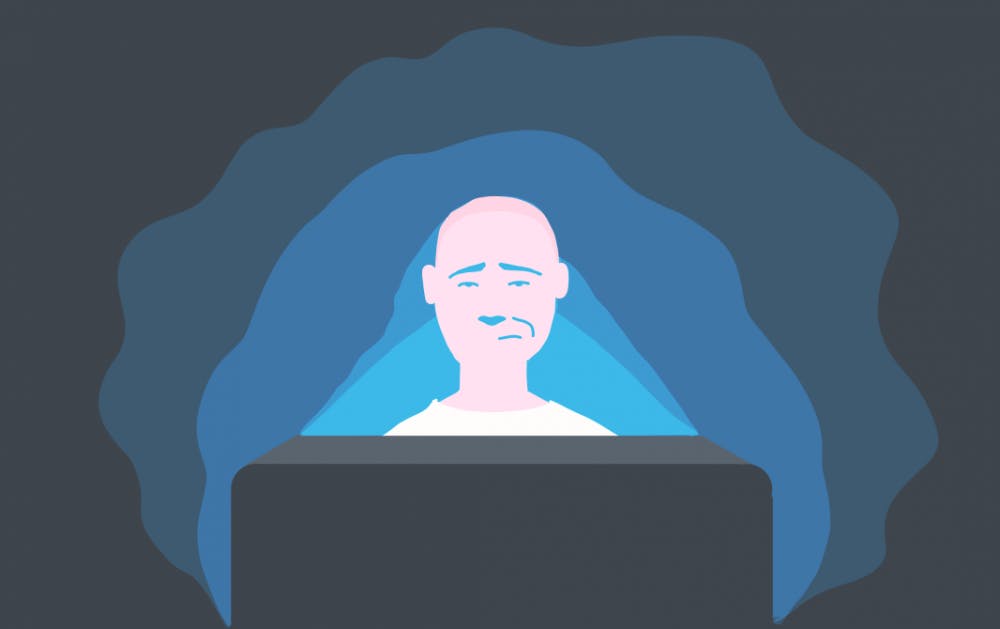It's not uncommon on social media, especially on Twitter, to see people posting things like "all these girls are so bipolar" or "my professor is literally psychotic." We’ve all heard it.
People sometimes use terms that are meant to describe a mental illness to exaggerate a slightly stressful situation, to make a joke online or to insult another person.
However, this practice is incredibly harmful.
Falsely labeling mental illnesses online waters down these words so that people who deal with mental illnesses no longer have the language to accurately express their experiences.
When someone posts hyperbolic tweets that blur the line between a joke and actual mental distress, that language becomes normalized, then someone actually experiencing suicidal thoughts or tendencies might not feel that they'd be taken seriously when reaching out to friends.
According to a 2016 annual report through Center for Collegiate Mental Health, there are over 150,000 college-age students seeking mental health treatment. The amount of students struggling with mental health should serve as a reminder of how important this topic is.
A 2007 study published in BioMed Central that discussed how language affects the way young people perceive those with mental illness suggests that labels stigmatize those with mental illness.
The study found that the rate of children and teens who seek help “may be improved by interventions that address both their lack of factual information about mental illness and those which reduce their strong negative emotional reactions towards people with mental illness.”
As the language surrounding mental health becomes justified, those that are affected by this may feel more comfortable to come forward.
The way we talk about mental health and mental illness shapes the way we react to it. As social media continues to make mental health its joke, the more these issues will become stigmatized.
James Bludworth, a professor of counseling psychology at ASU, said making light of mental illness online can also make it harder for those in need to get help.
"It creates a stigma, and oftentimes prevents people from asking for the help that they need," Bludworth said. "Oftentimes common phrases that get misused can create unnecessary stigma around these illnesses. Misusing these terms minimizes the suffering of those who have these conditions.”
Granted, it could be argued that people who are struggling make jokes about their experiences to cope with them, but even that is problematic. This may continue to disconnect the experiences of those who deal with mental illness from the words that are supposed to help describe them.
Rather than exaggerating a response to a normal situation, people should take the time to find more appropriate language for how they feel.
Rather than making a joke at someone else’s expense online by calling them “bipolar,” “psychotic” or “suicidal,” rethink the post. Using words that are meant to be connected to mental illnesses casually online or in person strips the power and sense of identity away from them.
Language is a slippery, confusing thing, but its impact should not be underestimated. The culture has continued to shift around the words we find acceptable in conversation and in what contexts they can be used.
It is not enough to hope someone else will stand up and say something about destigmatizing mental illness. The process begins with education and the conscious decision to stop making a joke out of another person's struggle.
If you are in crisis or need help right now, please call the National Suicide Prevention Lifeline at 1-800-273-8255. Additionally, you can call EMPACT’s 24-Hour ASU-dedicated Crisis Line at 480-921-1006.
A host of mental health services for students can be found at ASU Counseling Services.
Reach the reporter at cfusillo@asu.edu or follow @katiefusillo on Twitter.
Editor’s note: The opinions presented in this column are the author’s and do not imply any endorsement from The State Press or its editors.
Want to join the conversation? Send an email to opiniondesk.statepress@gmail.com. Keep letters under 500 words and be sure to include your university affiliation. Anonymity will not be granted.
Like The State Press on Facebook and follow @statepress on Twitter.




